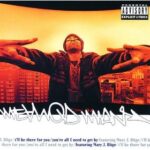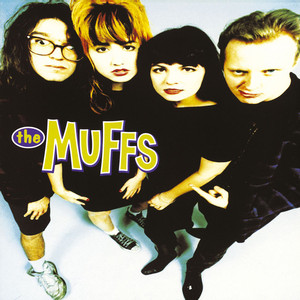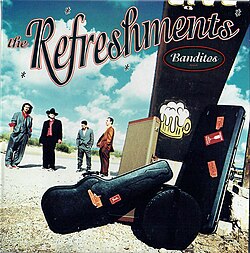 In 1995, the worlds of hardcore hip-hop and soul-drenched R&B collided in a way that felt both groundbreaking and inevitable. The track was “I’ll Be There for You/You’re All I Need to Get By,” a collaboration between Wu-Tang Clan member Method Man and the reigning “Queen of Hip-Hop Soul” Mary J. Blige. Released at a time when rap was still wrestling with mainstream acceptance, the song did more than just climb the charts—it redefined what hip-hop could sound like when married to R&B, and it created one of the most enduring love anthems in modern music history.
In 1995, the worlds of hardcore hip-hop and soul-drenched R&B collided in a way that felt both groundbreaking and inevitable. The track was “I’ll Be There for You/You’re All I Need to Get By,” a collaboration between Wu-Tang Clan member Method Man and the reigning “Queen of Hip-Hop Soul” Mary J. Blige. Released at a time when rap was still wrestling with mainstream acceptance, the song did more than just climb the charts—it redefined what hip-hop could sound like when married to R&B, and it created one of the most enduring love anthems in modern music history.
The record was raw and tender at once, steeped in the grit of Method Man’s lyricism but elevated by Mary J. Blige’s soulful delivery. It was hip-hop with heart, and it resonated with audiences in a way few rap songs had before. The song would eventually win a Grammy Award, dominate radio play, and cement itself as a cultural touchstone that still echoes through modern collaborations between rappers and R&B singers.
This is the story of how “I’ll Be There for You/You’re All I Need to Get By” was created, how it captured a cultural moment, and why it remains one of the greatest hip-hop love songs of all time.
The Origins: From Wu-Tang to a Love Ballad
By the mid-1990s, Method Man had already established himself as one of the breakout stars of the Wu-Tang Clan. The Staten Island collective’s debut album, Enter the Wu-Tang (36 Chambers) (1993), had shocked the hip-hop world with its raw sound, martial arts imagery, and uncompromising street narratives. Method Man, with his gravelly voice, witty rhymes, and charismatic presence, stood out as a natural star.
When Def Jam signed him for a solo deal, the result was Tical (1994), an album that leaned heavily into the Clan’s dark, atmospheric production. While Tical was praised, it lacked an accessible, radio-friendly single. Enter “All I Need,” a track tucked into the album that sampled Marvin Gaye and Tammi Terrell’s classic Motown duet “You’re All I Need to Get By.”
The original album version was gritty and understated, a deep cut that showed Method Man’s softer side. But it was the remix—crafted by RZA, Puff Daddy, and Trackmasters, and featuring Mary J. Blige—that turned it into a cultural phenomenon.
Mary J. Blige: The Queen of Hip-Hop Soul
Mary J. Blige was the perfect collaborator for Method Man. By 1995, she had already carved out a reputation as the voice of a generation, blending hip-hop swagger with soul sensibility on albums like What’s the 411? and My Life. Her ability to channel raw emotion made her the ideal counterpart to Method Man’s streetwise lyricism.
When Blige stepped into the booth to reimagine “All I Need,” she transformed it. Her vocals brought warmth and vulnerability to the track, softening the edges of Method Man’s rhymes while amplifying the song’s emotional core. It was a pairing that made perfect sense: he was the hardened MC; she was the soulful healer. Together, they bridged the gap between two worlds that were often treated as separate.
The Making of the Remixes
“I’ll Be There for You/You’re All I Need to Get By” exists in multiple versions, each with its own flavor and influence:
-
Razor Sharp Remix (produced by RZA) – This version kept the Wu-Tang aesthetic intact, with darker, more minimal production. It retained the underground grit but added Mary J. Blige’s vocals to highlight the song’s emotional pull.
-
Puff Daddy/Trackmasters Remix – The more radio-friendly remix, this version leaned into the Motown influence, layering lush instrumentation and hooks that made it perfect for mainstream play. Puffy’s knack for glossy production turned the track into a crossover hit without losing its hip-hop authenticity.
Both versions captured different facets of the same idea: love as loyalty, commitment, and ride-or-die partnership. Whether you were drawn to the rawness of the RZA cut or the polish of Puffy’s, the chemistry between Method Man and Mary J. Blige was undeniable.
Lyrical Content: A New Kind of Love Song
What set “I’ll Be There for You” apart from previous rap records was the way it approached love. Hip-hop had, of course, touched on romance before—LL Cool J’s “I Need Love” (1987) being the most notable example—but those efforts often leaned into sentimentality. Method Man’s take was different: it was rugged, grounded, and real.
Lines like:
“Back when I was nothin’, you made a brother feel like he was somethin’ / That’s why I’m with you to this day, boo, no frontin’.”
These weren’t the polished lines of a traditional ballad. They were raw confessions, framed in the language of the streets. Method Man’s verses conveyed vulnerability without sacrificing toughness, while Mary J. Blige’s chorus reassured and uplifted, echoing the devotion of Marvin Gaye and Tammi Terrell’s Motown original.
The brilliance of the song lay in its balance. It wasn’t about fantasy—it was about reality. Love here was not just about passion, but loyalty, resilience, and survival. It was a love song that felt authentic to hip-hop’s world, and audiences recognized its honesty.
Reception and Commercial Success
When the single was released in 1995, it quickly became a smash hit. The Puff Daddy remix dominated radio, while the Razor Sharp mix earned credibility with hip-hop purists. Together, they allowed the track to live in two worlds simultaneously.
The single peaked at #3 on the Billboard Hot 100, topped the Hot Rap Singles chart, and became one of Method Man’s biggest commercial successes. It also earned Method Man and Mary J. Blige the Grammy Award for Best Rap Performance by a Duo or Group in 1996, a milestone that validated hip-hop’s growing mainstream dominance.
For Method Man, the song proved he could appeal beyond hardcore rap fans. For Mary J. Blige, it reinforced her role as the bridge between hip-hop and R&B. And for Def Jam and the industry at large, it demonstrated the commercial power of rap/R&B collaborations, paving the way for countless future pairings.
Cultural Impact
“I’ll Be There for You/You’re All I Need to Get By” is often cited as one of the first true hip-hop love anthems, and its influence is hard to overstate. The track set the blueprint for rapper-singer collaborations that would become a staple of the genre. Without Method Man and Mary J., it’s hard to imagine later hits like Ja Rule and Ashanti’s duets, Nelly and Kelly Rowland’s “Dilemma,” or even Drake’s frequent partnerships with R&B vocalists.
Beyond its influence on music, the song captured a cultural moment. In the mid-1990s, hip-hop was still fighting for recognition as a legitimate art form. By aligning it with a classic Motown standard and pairing it with Mary J. Blige’s soulful vocals, the track helped legitimize rap as capable of producing timeless, universal songs about love and commitment.
The video also contributed to its cultural resonance. Directed with gritty simplicity, it showed Method Man and Mary J. Blige in an urban setting, keeping the focus on authenticity rather than glamour. It underscored the song’s message: love wasn’t about luxury or fantasy—it was about standing by one another through life’s challenges.
The Grammy Win: A Turning Point
The Grammy Award for “I’ll Be There for You” was more than just a trophy. In 1996, hip-hop was still relatively underrepresented at the Grammys, often confined to a single category. For Method Man and Mary J. Blige to win with a love song—a form of hip-hop that critics had sometimes dismissed as incompatible with the genre’s roots—was a breakthrough.
It signaled that hip-hop could be more than aggressive battle raps or party anthems; it could also be tender, introspective, and universal. That recognition helped expand the genre’s horizons and opened doors for artists exploring similar territory.
Lasting Legacy
Nearly three decades later, “I’ll Be There for You/You’re All I Need to Get By” remains a cornerstone of both artists’ legacies. Method Man would go on to enjoy a long career, not only with Wu-Tang Clan but as an actor and solo artist. Yet for many fans, this track remains his defining crossover moment.
For Mary J. Blige, the song reinforced her title as the “Queen of Hip-Hop Soul,” solidifying her ability to blend genres seamlessly. It’s a collaboration that continues to define her career as much as her own solo hits.
The track is still celebrated in retrospectives, frequently appearing on lists of the greatest hip-hop songs of all time. Its combination of street grit and soulful devotion remains unmatched, and its influence can be heard in nearly every rap-and-R&B pairing that followed.
Why It Still Resonates
The staying power of “I’ll Be There for You” comes down to three factors: authenticity, chemistry, and universality.
-
Authenticity: Method Man’s verses feel real, grounded in lived experience. They don’t shy away from vulnerability, and that honesty resonates.
-
Chemistry: The combination of Method Man’s rugged delivery and Mary J. Blige’s soaring vocals is electric. Few collaborations have ever captured such perfect balance.
-
Universality: At its core, the song is about love and loyalty—timeless themes that cut across genres and generations.
Even in 2025, the track doesn’t sound dated. Its blend of hip-hop beats and soulful vocals feels fresh, a testament to its innovative spirit. It remains a go-to for weddings, anniversaries, and celebrations of love—something few rap songs can claim.
Conclusion
“I’ll Be There for You/You’re All I Need to Get By” was more than just a hit single—it was a cultural landmark. It bridged the gap between hip-hop and R&B, proved that rap could produce timeless love songs, and laid the foundation for decades of crossover hits. It elevated both Method Man and Mary J. Blige to new heights while giving hip-hop a new vocabulary for expressing love and devotion.
When listeners revisit the song today, they’re not just hearing a 1990s classic. They’re hearing a turning point in music history, a moment when rap and soul merged into something greater than the sum of its parts.
Method Man and Mary J. Blige didn’t just make a hit—they made history. And as long as love songs remain essential to music, “I’ll Be There for You” will always stand tall as one of hip-hop’s greatest.


